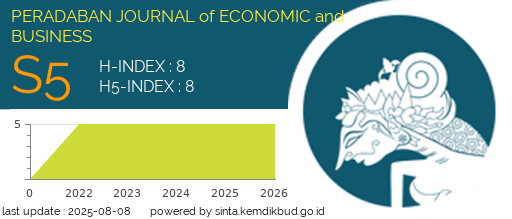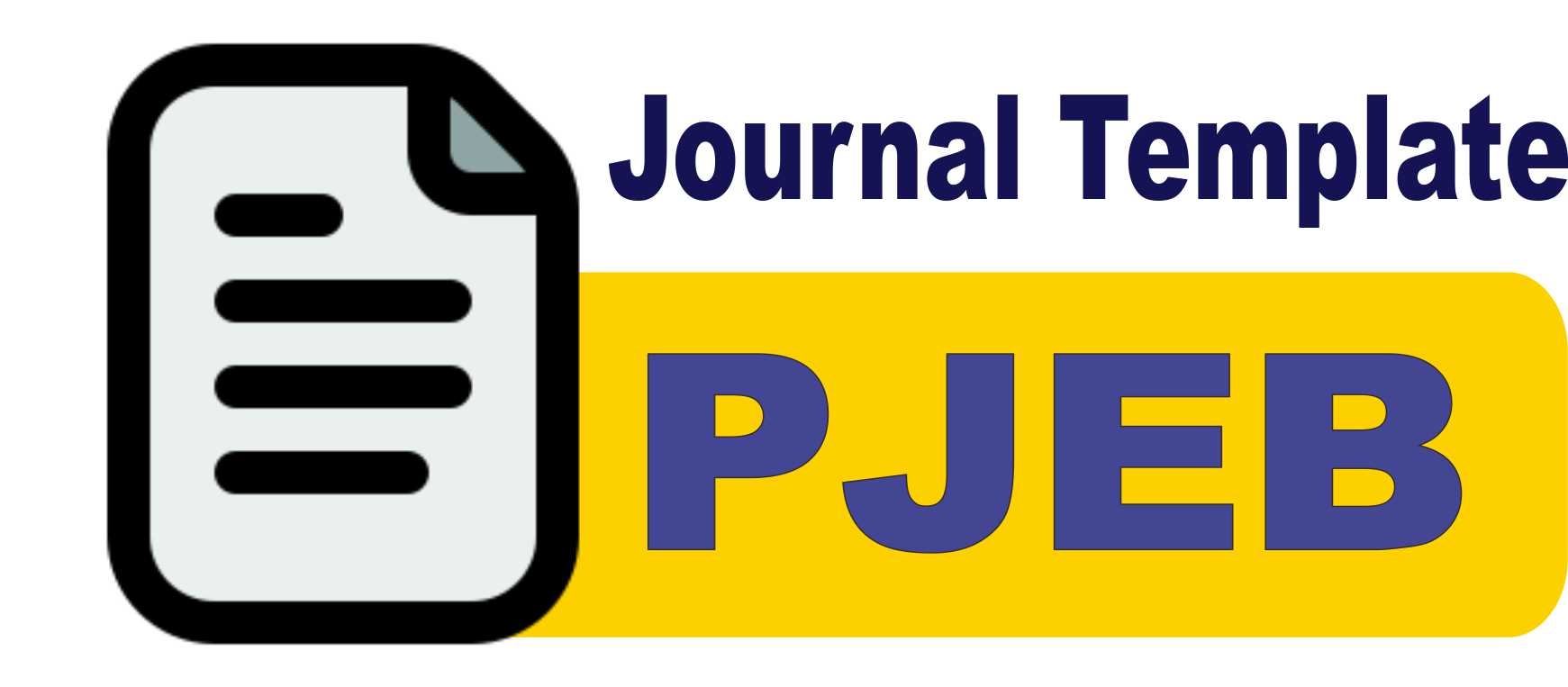UTAUT Model to Explore Factors Influencing QRIS Adoption Among Economics Students in Malang
DOI:
https://doi.org/10.59001/pjeb.v2i2.106Keywords:
QRIS adoption, UTAUT model, performance expectancyAbstract
In this quantitative descriptive research study, we investigate the adoption of the Indonesian Standard Quick Response Code (QRIS) among economics students in the Malang region. Our particular focus centers on the Unified Theory of Acceptance and Use of Technology (UTAUT) model. The research involves a sample of 120 economics students drawn from UIN Malang, Univ Brawijaya, and Univ Negeri Malang. Data collection is conducted through a questionnaire that examines four key variables: performance expectancy, effort expectancy, social influence, and facilitating conditions. The findings underscore the significant influence of performance expectancy on the intention to use QRIS, while the remaining variables exhibit positive yet non-significant relationships. This study provides valuable insights into the pivotal role of performance expectancy in driving QRIS adoption among economics students and highlights its potential implications for fostering a sustainable economy in the Malang region.
References
Alkhowaiter, W. A. (2020). Digital payment and banking adoption research in Gulf countries: A systematic literature review. International Journal of Information Management, 53, 102102. https://doi.org/10.1016/j.ijinfomgt.2020.102102
Am, N. A. M. (2021). SDG’s dalam Pembangunan Ekonomi Pasca Pandemi. Jurnal Indonesia Sosial Sains, 2(08), 1330–1343. https://doi.org/10.59141/jiss.v2i08.387
Asiah, N., & Birwin, A. (2019). HUBUNGAN FAKTOR IBU DENGAN KEJADIAN STUNTING. Prosiding Seminar Nasional Berseri, 91–100. https://doi.org/10.22236/semnas/1191-100171
Bank Indonesia. (2015). Profil Bisnis UMKM.pdf. Bank Indonesia. Retrieved from https://www.bi.go.id/id/umkm/penelitian/Documents/Profil%20Bisnis%20UMKM.pdf
Ezeh, P. C. (2018). (PDF) Factors that Influence the Acceptance of Mobile Money in Nigeria. 8(2), 684. http://dx.doi.org/10.17722/jorm.v8i2.217
Febriani, N. K. D., Utami, N. W., & Putri, I. G. A. P. D. (2023). Analisis Behavioral Intention dan Use Behavior Quick Response Code Indonesian Standard (QRIS) Pada UMKM Dengan Metode UTAUT 2 di Kota Denpasar. Jurnal Ilmiah Teknologi Informasi Asia, 17(1), 67–82. https://doi.org/10.32815/jitika.v17i1.890
Iskandar, H. (2020). SDGs Desa: Percepatan pencapain tujuan pembangunan Nasional berkelanjutan / A. Halim Iskandar, | OPAC Perpustakaan Nasional RI. Yayasan Obor Indonesia. Retrieved from https://opac.perpusnas.go.id/DetailOpac.aspx?id=1353604
Julismin, J. (2013). Dampak dan Perubahan Iklim di Indonesia. JURNAL GEOGRAFI, 5(1), 39–46. https://doi.org/10.24114/jg.v5i1.8083
Kasali, R. (2018). The Great shifting / Rhenald Kasali ; editor, Andi Tarigan | OPAC Perpustakaan Nasional RI. (A. Tarigan, Ed.). Jakarta: PT Gramedia Pustaka Utama. Retrieved from https://opac.perpusnas.go.id/DetailOpac.aspx?id=1130193
Khalil, S., Kakar, M. K., & Waliullah. (2007). Role of Tourism in Economic Growth: Empirical Evidence from Pakistan Economy. 46(5). Retrieved from https://www.researchgate.net/publication/227472288_Role_of_Tourism_in_Economic_Growth_Empirical_Evidence_from_Pakistan_Economy
Mangeswuri, D. R., Wuryandani, D., Purwanto, N. P., Permana, S. H., Meilani, H., Sayekti, N. W., & Rivani, E. (2018). Industri kreatif, fintech dan UMKM dalam era digital / penulis, Dewi Restu Mangeswuri, Dewi Wuryandani, Niken Paramita Purwanto, Sony Hendra Permana, Hilma Meilani, Nidya Waras Sayekti, Edmira Rivani ; editor, Carunia Mulya Firdausy | OPAC Perpustakaan Nasional RI. (C. M. Firdausy, Ed.). Jakarta: Pusat Penelitian Badan Keahlian DPR RI Bekerjasama dengan Inteligensia Intrans Publishing. Retrieved from https://opac.perpusnas.go.id/DetailOpac.aspx?id=1223984
Mareta, D. A. D. S., Putrayasa, I. P. A. A., & Mahayani, N. K. D. (2022). PERAN GENERASI Z DALAM PENINGKATAN EKONOMI SOCIETY 5.0. Prosiding Pekan Ilmiah Pelajar (PILAR), 2, 761–767.
Nor, K. M., & Pearson, J. M. (2008). An Exploratory Study Into The Adoption of Internet Banking in a Developing Country: Malaysia. Journal of Internet Commerce, 7(1), 29–73. https://doi.org/10.1080/15332860802004162
Nurhayati, D., Dhokhikah, Y., & Mandala, M. (2020). Persepsi dan Strategi Adaptasi Masyarakat Terhadap Perubahan Iklim di Kawasan Asia Tenggara. JURNAL PROTEKSI: Jurnal Lingkungan Berkelanjutan, 1(1), 39–44.
Nurmala, N., Sinari, T., Lilianti, E., Jusmany, J., Emilda, E., Arifin, A., & Novalia, N. (2022). Usaha Kuliner Sebagai Penggerak Umkm Pada Masa Pandemi Covid 19. AKM: Aksi Kepada Masyarakat, 3(1), 65–74. https://doi.org/10.36908/akm.v3i1.458
Patil, P., Tamilmani, K., Rana, N. P., & Raghavan, V. (2020). Understanding consumer adoption of mobile payment in India: Extending Meta-UTAUT model with personal innovativeness, anxiety, trust, and grievance redressal. International Journal of Information Management, 54, 102144. https://doi.org/10.1016/j.ijinfomgt.2020.102144
Polat, L., & Erkollar, A. (2021). Industry 4.0 vs. Society 5.0. https://doi.org/10.1007/978-3-030-62784-3_28
Setiawan, I. W. A., & Mahyuni, L. P. (2020). QRIS DI MATA UMKM: EKSPLORASI PERSEPSI DAN INTENSI UMKM MENGGUNAKAN QRIS. E-Jurnal Ekonomi Dan Bisnis Universitas Udayana, 921–946. https://doi.org/10.24843/EEB.2020.v09.i10.p01
Srivastava, S., Chandra, S., & Theng, Y.-L. (2010). Evaluating the Role of Trust in Consumer Adoption of Mobile Payment Systems: An Empirical Analysis. Communications of the Association for Information Systems, 27. https://doi.org/10.17705/1CAIS.02729
Suci, Y. R. (2017). PERKEMBANGAN UMKM (USAHA MIKRO KECIL DAN MENENGAH) DI INDONESIA. Jurnal Ilmiah Cano Ekonomos, 6(1), 51–58.
Susanti, S. D. (2022, February 24). BI targetkan tambahan 15 juta merchant UMKM gunakan QRIS tahun ini. Retrieved 26 September 2023, from Antara News website: https://www.antaranews.com/berita/2723381/bi-targetkan-tambahan-15-juta-merchant-umkm-gunakan-qris-tahun-ini
Türker, C., Altay, B. C., & Okumuş, A. (2022). Understanding user acceptance of QR code mobile payment systems in Turkey: An extended TAM. Technological Forecasting and Social Change, 184, 121968. https://doi.org/10.1016/j.techfore.2022.121968
Venkatesh, V., Morris, M. G., Davis, G. B., & Davis, F. D. (2003). User Acceptance of Information Technology: Toward a Unified View. MIS Quarterly, 27(3), 425–478. https://doi.org/10.2307/30036540





